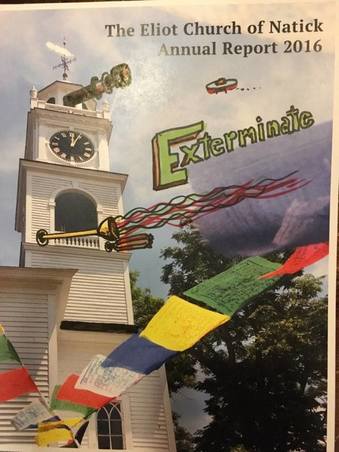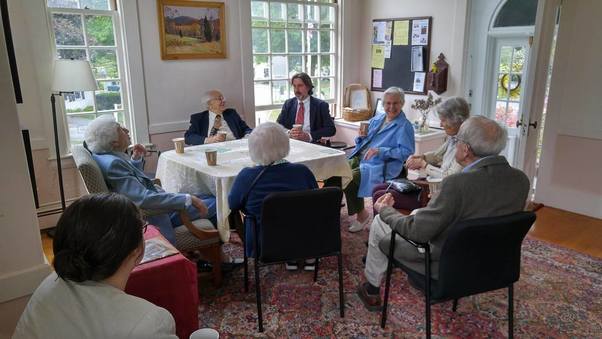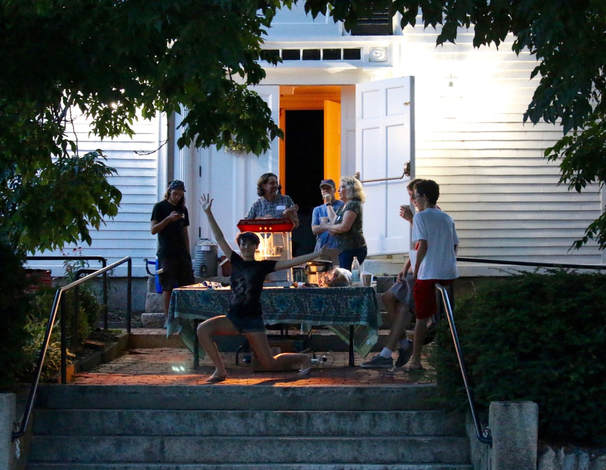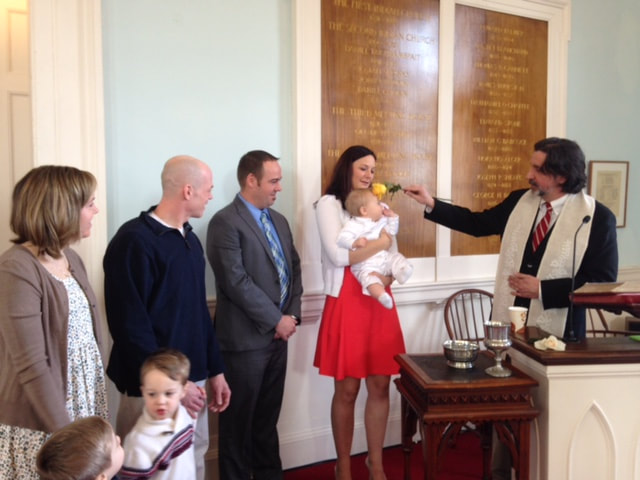 Back during my first sabbatical I made study of Samuel Longfellow. You should check him out... “A Spiritual and Working Church” Before I say goodbye to the collection of Samuel Longfellow's sermons that has given me much food for thought over the past two weeks, I wanted to pick out one more sermon in which he described the church that he hoped to build in Brooklyn. The date is October 30, 1853, the day he officially "assumed the pastorate" in the words of his editor. The topic for the day was his vision of the church, how it should function, and what its role should be in the rapidly growing city they were a part of. Like many sermons of its era, it is one with a clear structure. It was meant to convey fairly complicated and important concepts to his listeners and to do it efficiently by the standards of the time. It is short on stories and humor, but it still reads well and it isn't all that hard to imagine it being spoken. He begins by reminding us that the word "church" "implies some common idea or purpose. It represents something more than a mere aggregate of persons such as individual and separate errands may bring together at any hour in the crowded streets of a city...we limit, however, the word church to that unity whose central idea is a religious one--the idea of God." he goes on to list a variety of "churches". There are Jews, Muslims, Hindus and Christians at least, and he leaves room for others as well. Not too bad for the 19th Century pastor (though he really does use the term "church" for each of them, which was rather jarring to my modern ears). Then, after waxing poetic for a while about the virtues of faith communities, he gets down to his first set of "three points" (preachers know what I mean) by defining church as "a society of men and women and children, associated by a religious spirit, and for religious work". The first word he picks out of his definition is the word "religious". "A church must justify its existence by this, that it holds as its special thought--not its exclusive possession, but its special thought--the idea of God." Today we might argue about what his (or our) definition of that "special thought" might be. After all, there are plenty of devoted church-goers in my congregation and not all of them are sure what they think or believe about God. However, the idea if God is an obvious--if sometimes ambiguous--one. He then also chooses to emphasize the word "spirit". There are many folks who like to say that they are "spiritual but not religious". For Longfellow, however, the term is rooted deeply in the life of faith communities. In fact, in the liberal church the religious spirit is essential as these bonds may tie us more closely than the those of belief. "I do not deny that similarity of opinion is a bond of union. We are drawn to those who think like ourselves. But it is not the strongest or deepest bond. It is easily overridden by spiritual sympathy, or annulled by the want of that." There are few ministers who have served for any period of time that could disagree with this. Many, many congregations come together over shared ideas, but if the the connections between individuals aren't also felt then there is no real community. Some congregations find this spirit quickly. For some it takes longer. It also ebbs and flows. When the spirit is lost (or at least not present) the congregation is dead--whether they continue to meet or not--and something else must rise to replace it. Finally, he addresses the word "work". The church is not a private debating society or health club, or therapy session. It is meant to be out in the world. " It seems to me as if, whenever a new church is formed, earth's suffering, sinning, wronged, and perishing ones should lift up their heads and a new hope light up their eyes, as they cried, "You will help us, you will save us". Churches should work together to support each other and work beyond their doors to alleviate suffering and follow the teachings of Jesus. It is a tall order. However, work is needed to balance out the otherwise navel-gazy nature of religious communities. Finding this balance is the challenge that faces our churches today. Sometimes we lean one way. At other times we tilt in another direction. It is our way as people. Sabbatical, perhaps not surprisingly, is designed to help the pastor to find that balance. The religious work of the church is the job of the minister. It is the job of others as well, but usually part-time. Pastors are paid to think about the church and its members full-time. Often to the detriment of the her or his own religious spirit. Hence the extended sabbath. Longfellow has three more "points" to his sermon. They are the kinds of work that the church does. First he lists the Culture of the Religious Spirit by which he means those things that spring most quickly to mind when we think of church. Worship, rites of passage, and communion are examples of this first type of work. The second is Religious Education, the deepening and growing of the faith for both young and old. Finally (and he cheats here by including two things as one) there is the category of Religious Benefice and Philanthropic Action. Here he is thinking of what we more often call "social service" and "social justice." It is clear that he does mean both. Again there is the question of balance. We have limited time and resources. Where do we put them? It seems to me that finding balance between both sets of "points" comes down to our capacity for thoughtful discernment. How do we, as people and as congregations, find ways to consider issues of importance with as little anxiety as possible? How do we remember the spirit that flows through us and between us, while also nurturing that spirit? How do we become religious? How do we make our communities of faith this way as well? The answers to these questions vary. We are a diverse species and our faith reflects that. However, I think these are questions that we all must consider both for ourselves and for the congregations we love.
0 Comments
Dear Members and Friends, Worship and Religious Education are well underway this year. I have been enjoying getting to touch base with you all as we have gone about our usual opening rituals. I enjoyed getting to see folks at the Kickoff Sunday brunch. I was moved by the sharing at our the Gathering of the Waters during our ingathering. This congregation is a community that supports and hears each other. It is wonderful to be getting back together after our summer journeys. It was also great to see so many of you make an effort to get to church! This brings me to another topic that I would like to touch on briefly. I want to talk to you about attendance. Keep reading! You can do it! It may even be helpful to know that our current attendance is slightly higher this year... We have always been a church with a much larger membership than we see regularly on Sundays. This is fine. In fact, even though this is the case, most people do manage to drop in from time to time. People work hard to make it to non-worship events when they come up on the calendar. Which is to say that we attend Pub Theology, Dungeons & Dragons, philosophy discussions (like our Emerson group), Chili Cookoffs, house parties, vigils, rallies, and workdays, among other things. We are there for each other outside of church and for casual gathers, too. Eliot Church is blessed by a dedicated membership. It’s just that we can get really, really busy. The world isn’t constructed around “sacred time”. Many of our members work on Sundays. Others have rigorous travel schedules. There are illnesses, child commitments, weather challenges, and social obligations that get in the way of making it every week. I get it. There are weeks I don’t make it to church either. However, I would like to encourage all of us to make a point of attending worship when we can this year. In fact, I would like you to consider committing to making it to church more than you did last year! I will, too. I can think of an infinite number of reasons why we should make an effort. I bet you can think of a few as well. However, I would like to mention three key reasons for this church this year. Our Faith Community Needs Our Presence To Thrive: You may have noticed over the years that Eliot Church has gone through some changes. We are very much a community in transition. Our RE program is divided between teens and toddlers with no one in between. Our outreach and justice work (and, therefore our profile in the community) has increased substantially. We have also grown closer together as individuals. Heck, we even go skiing in New Hampshire together! The fact is, this church is doing a lot of work and having a lot of fun. We need your presence to make the party better. We need your participation to make the load lighter. We need your ideas to maintain this congregation and guarantee its future. Right now the church is strong. We want to keep it that way. This won’t just happen on it’s own. I am serious. There are no guarantees. If you value the Eliot Church, it isn’t enough to love it from afar. We need you to be here with us to keep it a living, loving, vibrant place. Worship is the biggest part of that. It is central to everything else we do. Our Faith Community Needs Our Presence for Others: Guess what? Loving Eliot Church from afar doesn’t help when we have visitors, either. Worship is usually where they encounter the congregation for the first time. The past couple of weeks we have had a few newbies drop by. If you are not here, they don’t know that you are part of what is happening. They only see those who showed up that day. Yeah, we do our best when people cannot make it. That said, when new folks come to church they are looking for others on the same spot in their life-path. It’s not that they don’t want to hang with everyone else. They just want to know that people like them are welcome and supported! That means they want to see parents of young children, new empty nesters, retirees, young couples and old couples and be greeted by those people. Life can be lonely. Visitors want to see folks who are interested in the same things they are interested in. In a small church--and being a small church is also our strength--the challenge is that when one or two individuals or families cannot make it on a Sunday, it is like that entire group just doesn’t exist. Once again, part of belonging is showing up. If visitors do not make some sort of connection with people they identify with after a couple of weeks? They find somewhere else to go to church. The congregation misses out on potential members. We members miss out on potential friends. Those visitors miss out on a community that they may have loved and would have loved them. We Need Our Faith Community: Look, getting through the week is hard. It is isolating. There are times when all we do is move from task to task. Even things we enjoy take time and effort. They leave us feeling tired and wiped out. Maybe there are moments when we just want to “sleep in” on Sunday. This certainly happens to me. However, when we step back and really consider it, that doesn’t make much sense. Let’s set aside the fact that services are at 10am. When we are home most of us can realistically both sleep in and get to church on time. I get up between 5 and 6 most mornings. I bet a lot of the rest of the congregation does too. We get the kids off to school and then get to work by 8 or 9. The only “school” the kids have on Sunday is at church. Also, the commute to Eliot is usually pretty easy. It is near where we live. Traffic is light. What we are really suffering from is inertia. We forget that church has something to offer. We forget that it is only an hour long on the slowest day of the week. We are forgetting that we need to feed our spirits. We need the church but we worry too much about the demands of our everyday lives and neglect the sacred elements that give those lives meaning. This is what keeps us home. The fact is, what sustains us is exactly what the church is offering. Stressed out and tired? Come sit with us and take a while to put those worries in perspective. Find some solace and new life in the rituals and ancient wisdom that worship provides. Do you feel isolated? Guess what! Your friends are at church. We can talk to you about your problems. We can listen to you talk. We can just have some coffee. We are not the first people to feel the way we do. That is why we are meant to join in community to explore the Divine. Coming together in worship helps us to live lives of greater meaning and strength.  Final Note: As I mentioned at the beginning of this long screed, people are, in fact, coming to church. Also, those of you who were around a couple of weeks ago know that I made a big thing in the sermon about how worship attendance and participation is non-coercive in our tradition. That is true. Neither I nor the leadership is interested in making anyone do anything they don't want to do. That said, part of my job is to observe and encourage. Both your own spiritual well being and the future well-being of this community are in your hands. In this new church year, it is my hope that we continue to grow together as a healthy community of faith This Sunday we will gather in worship. We will have coffee hour. We will practice what we preach about being a caring spiritual community. I hope you can make it. If you cannot, then I hope to see you when you are able! See You in Church, Adam |
Adam Tierney-EliotThis is my old weblog of many years. I will probably post here from time to time is there is a subject that does not fit WWG. However WWG is the more active page at this point. Archives
April 2022
Categories
All
|



 RSS Feed
RSS Feed